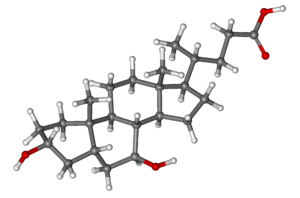熊去氧胆酸
(重定向自熊脫氧膽酸)
熊去氧胆酸(英語:Ursodeoxycholic acid,也被称为3α,7β-二羟基-5β-胆烷-24-羧酸,3α,7β-dihydroxy-5β-cholan-24-oic acid,缩写 UDCA),是一种来自熊膽的胆汁酸[1],为次级胆汁酸,在大部分动物体内由初级胆汁酸经由细菌代谢生成。熊科动物可以直接合成这种胆汁酸。[2]
 | |
 | |
| 臨床資料 | |
|---|---|
| 商品名 | Actigall |
| 其他名稱 | ursodeoxycholic acid, Actigall, Ursosan, Urso, Urso Forte |
| AHFS/Drugs.com | Monograph |
| MedlinePlus | a699047 |
| 核准狀況 | |
| 懷孕分級 |
|
| 给药途径 | oral |
| ATC碼 | |
| 法律規範狀態 | |
| 法律規範 |
|
| 识别信息 | |
| |
| CAS号 | 128-13-2 |
| PubChem CID | |
| IUPHAR/BPS | |
| DrugBank | |
| ChemSpider | |
| UNII | |
| KEGG | |
| ChEBI | |
| ChEMBL | |
| PDB配體ID | |
| CompTox Dashboard (EPA) | |
| ECHA InfoCard | 100.004.437 |
| 化学信息 | |
| 化学式 | C24H40O4 |
| 摩尔质量 | 392.56 g/mol |
| 3D模型(JSmol) | |
| 熔点 | 203 °C(397 °F) |
| |
| |
提纯的熊去氧胆酸在医学上用来溶解胆结石、胆泥,作用机理是增加胆汁内胆固醇的溶解度。[3][4]对于原发性胆汁性胆管炎、[5]原发性硬化性胆管炎、[6]妊娠期肝内胆汁淤积症[7]以及其他胆汁淤积[8]会造成化验数据上的疗效,但对移植率、生存率并没有正面效果。
歷史
编辑熊胆是熊去氧胆酸的天然来源。1955年,日本科学家成功化学合成了熊去氧胆酸[10]。1987年12月,艾尔建申請的熊去氧胆酸獲准在美國上市。[11]
合成
编辑工业上是通过半合成制造。牛肉工业的副产物之一是牛胆汁,其中富含胆酸。胆酸经过化学修饰即可变成熊去氧胆酸,合成产率约30%。[12]
参考文献
编辑- ^ 放過熊吧!可治療膽結石的熊膽早就能用化學合成. 食力 foodNEXT. [2021-12-08]. (原始内容存档于2021-12-08) (中文(臺灣)).
- ^ Hagey LR, Crombie DL, Espinosa E, Carey MC, Igimi H, Hofmann AF. Ursodeoxycholic acid in the Ursidae: biliary bile acids of bears, pandas, and related carnivores. Journal of Lipid Research. November 1993, 34 (11): 1911–1917. PMID 8263415. doi:10.1016/S0022-2275(20)35109-9 .
- ^ Hofmann AF. Medical dissolution of gallstones by oral bile acid therapy. American Journal of Surgery. September 1989, 158 (3): 198–204. PMID 2672842. doi:10.1016/0002-9610(89)90252-3.
- ^ Jüngst C, Kullak-Ublick GA, Jüngst D. Gallstone disease: Microlithiasis and sludge. Best Practice & Research. Clinical Gastroenterology. 2006, 20 (6): 1053–1062. PMID 17127187. doi:10.1016/j.bpg.2006.03.007.
- ^ Shi J, Wu C, Lin Y, Chen YX, Zhu L, Xie WF. Long-term effects of mid-dose ursodeoxycholic acid in primary biliary cirrhosis: a meta-analysis of randomized controlled trials. The American Journal of Gastroenterology. July 2006, 101 (7): 1529–1538. PMID 16863557. S2CID 32076958. doi:10.1111/j.1572-0241.2006.00634.x.
- ^ Lindor KD, Kowdley KV, Luketic VA, Harrison ME, McCashland T, Befeler AS, Harnois D, Jorgensen R, Petz J, Keach J, Mooney J, Sargeant C, Braaten J, Bernard T, King D, Miceli E, Schmoll J, Hoskin T, Thapa P, Enders F. High-dose ursodeoxycholic acid for the treatment of primary sclerosing cholangitis. Hepatology. September 2009, 50 (3): 808–814. PMC 2758780 . PMID 19585548. doi:10.1002/hep.23082.
- ^ Walker KF, Chappell LC, Hague WM, Middleton P, Thornton JG. Pharmacological interventions for treating intrahepatic cholestasis of pregnancy. The Cochrane Database of Systematic Reviews. July 2020, 2020 (7): CD000493. PMC 7389072 . PMID 32716060. doi:10.1002/14651858.CD000493.pub3.
- ^ Kotb MA. Review of historical cohort: ursodeoxycholic acid in extrahepatic biliary atresia. Journal of Pediatric Surgery. July 2008, 43 (7): 1321–1327. PMID 18639689. doi:10.1016/j.jpedsurg.2007.11.043.
- ^ Teresa Brevini, Mailis Maes, Gwilym J. Webb, Binu V. John, Claudia D. Fuchs, Gustav Buescher, Lu Wang, Chelsea Griffiths, Marnie L. Brown, William E. Scott, Pehuén Pereyra-Gerber, William T. H. Gelson, Stephanie Brown, Scott Dillon, Daniele Muraro, Jo Sharp, Megan Neary, Helen Box, Lee Tatham, James Stewart, Paul Curley, Henry Pertinez, Sally Forrest, Petra Mlcochova, Sagar S. Varankar, Mahnaz Darvish-Damavandi, Victoria L. Mulcahy, Rhoda E. Kuc, Thomas L. Williams, James A. Heslop, Davide Rossetti, Olivia C. Tysoe, Vasileios Galanakis, Marta Vila-Gonzalez, Thomas W. M. Crozier, Johannes Bargehr, Sanjay Sinha, Sara S. Upponi, Corrina Fear, Lisa Swift, Kourosh Saeb-Parsy, Susan E. Davies, Axel Wester, Hannes Hagström, Espen Melum, Darran Clements, Peter Humphreys, Jo Herriott, Edyta Kijak, Helen Cox, Chloe Bramwell, Anthony Valentijn, Christopher J. R. Illingworth, UK-PBC research consortium, Bassam Dahman, Dustin R. Bastaich, Raphaella D. Ferreira, Thomas Marjot, Eleanor Barnes, Andrew M. Moon, Alfred S. Barritt, Ravindra K. Gupta, Stephen Baker, Anthony P. Davenport, Gareth Corbett, Vassilis G. Gorgoulis, Simon J. A. Buczacki, Joo-Hyeon Lee, Nicholas J. Matheson, Michael Trauner, Andrew J. Fisher, Paul Gibbs, Andrew J. Butler, Christopher J. E. Watson, George F. Mells, Gordon Dougan, Andrew Owen, Ansgar W. Lohse, Ludovic Vallier, Fotios Sampaziotis. FXR inhibition may protect from SARS-CoV-2 infection by reducing ACE2. Nature. 2022-12-05 [2022-12-07]. ISSN 0028-0836. doi:10.1038/s41586-022-05594-0. (原始内容存档于2023-06-26) (英语).
- ^ Feng Y, Siu K, Wang N, Ng KM, Tsao SW, Nagamatsu T, Tong Y. Bear bile: dilemma of traditional medicinal use and animal protection. Journal of Ethnobiology and Ethnomedicine. 2009, 5 (1): 2. PMC 2630947 . PMID 19138420. doi:10.1186/1746-4269-5-2.
- ^ Actigall: FDA-Approved Drugs. U.S. [[美国食品药品监督管理局|]] (FDA). [29 April 2020]. (原始内容存档于2020-10-19).
- ^ Tonin F, Arends IW. Latest development in the synthesis of ursodeoxycholic acid (UDCA): a critical review. Beilstein Journal of Organic Chemistry. 2018, 14: 470–483. PMC 5827811 . PMID 29520309. doi:10.3762/bjoc.14.33 .